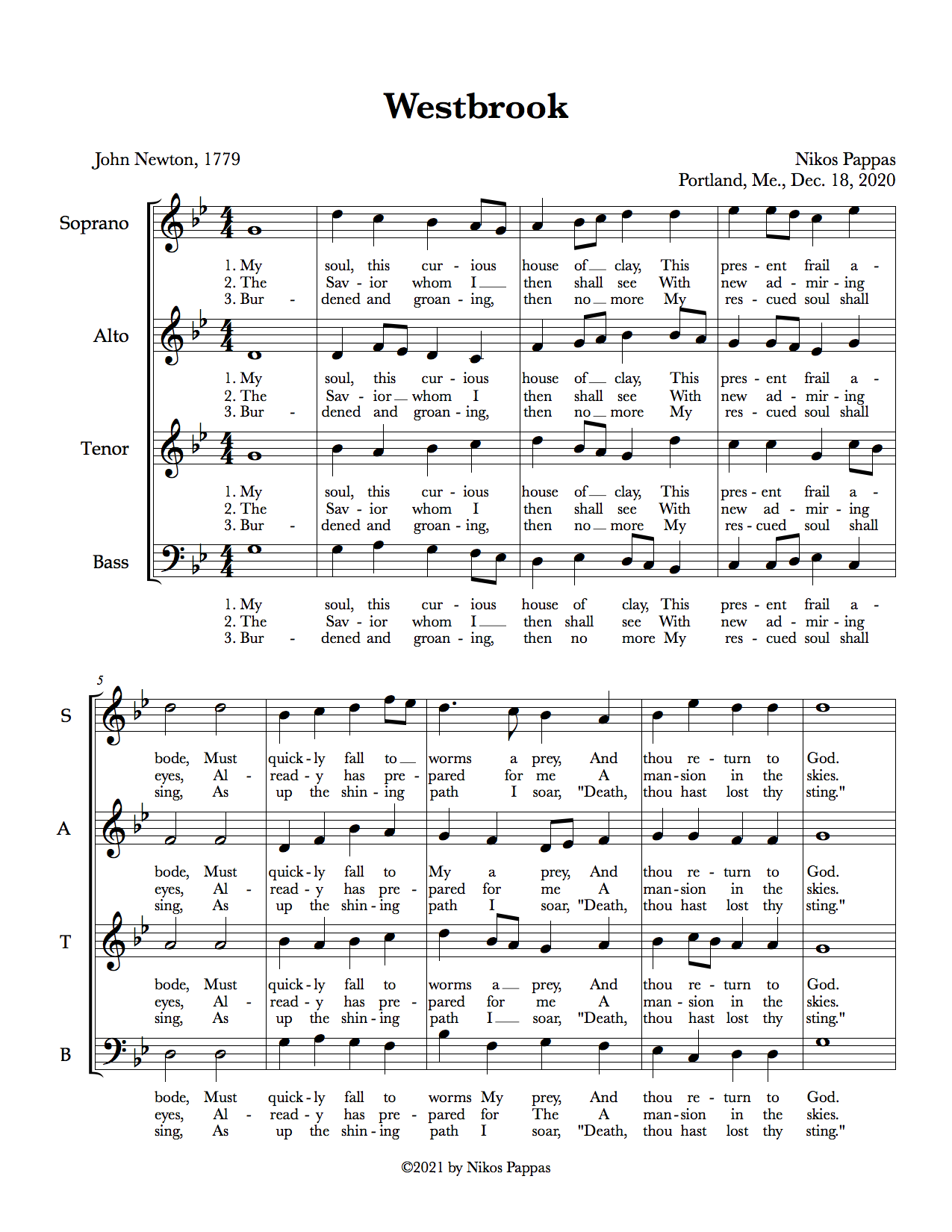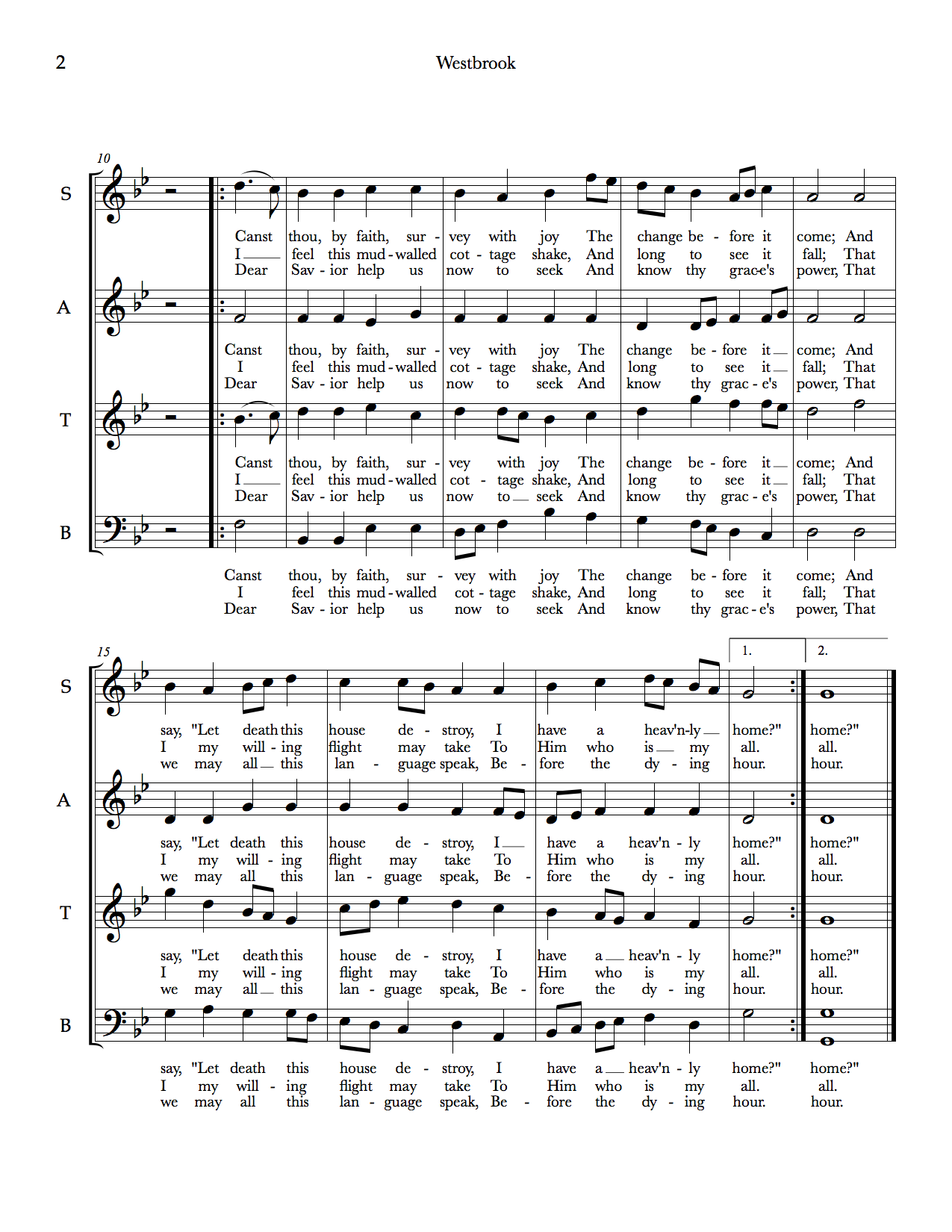Westbrook
- Nikos Pappas (V)
text and musical score, 2020.
Artist Statement
Composed in Portland at the Pharos House in 2020 shortly after arriving at the halfway house in contemplation of nearing the end of my sentence and returning home to be with loved ones.
As an artist, I situate my work within place and tradition, maintaining a symbiotic relationship between historical practice and its modern continuum. My creative growth springs from my familial connections to music within classical and traditional spheres of expression. This intertwining of influences creates a unique artistic form that informs my work as a scholar, academician, performer, and composer, as seen with the choral pieces submitted for the Freedom & Captivity: Art on Abolition virtual exhibition.
I first became interested in American traditional music in high school and devoted myself both to its study and performance before turning to composition in order to gain a more nuanced understanding of traditional stylings. I quickly realized the power of music for social justice as both performer and promoter of regional artists. I feel that music communicates best when rooted in its regional and national areas of practice, and the communities tied to this place. I champion music as a force for community empowerment and social betterment.
After being incarcerated, I continued my devotion to service through volunteering my talents to enrich the worship experience of Religious Services. Not only did I see the value of service to my community, but I also realized the power of music as a function of abolition. Inmates would often comment that my musical performances would transport them out of prison and they felt free, imagining themselves in a house of worship outside the walls of a prison. This support cemented further my devotion to service and education in preparing new arrangements and special pieces for special occasions, and teaching classes.
Alongside these public-facing activities, I compose music for my own amusement that reflects my devotion to my artistic integrity as an outlet for creative expression. I focus on composing traditional-style choral pieces with texts that often address sentiments of abolition and incarceration. Shifting my perspective on the social power and function of music as a force for change, I realize that this intimate and deeply personal outlet of creativity satisfies further my aesthetic ideals of place and tradition within a historical-regional continuum. The works submitted for this exhibition comprise a small selection of these creative compositional outlets.
Although I have written and arranged music for a wide range of ensembles in a variety of styles, I return most frequently to traditional-style, choral music. Not only does its history or regional connectivity and text as social commentary speak to me, but its performance style aligns with my ideals too. Not music for trained choirs, this style of music, though religious in text choice, is not considered specifically church music. It instead is social music, equally welcome in sacred and secular spaces such as the home and tavern, and transcends a specifically ecclesiastical audience. As such, I value a musical style that speaks to a wide range of settings across social stations, and conveys a message of empowerment while simultaneously remaining intensely personal and introspective, the perfect medium to challenging the strictures of incarceration and the imprisonment system.
Artist Bio
Nikos Pappas, born in 1976, was raised in Ohio in a family with connections to music extending back at least six generations to the 1840s. Though trained in classical music on violin, viola, and piano, he developed a passion for traditional music to discover his family roots and reclaim a sense of heritage and place within the American experience. Earning degrees in Music History (Ohio University) and Musicology (University of Kentucky), he became a recognized authority in American music, with a specialization in choral music and community singing of New England, the Mid-Atlantic, and the American south before 1870; colonial-era keyboard music; and vernacular music of the eighteenth and nineteenth centuries.
Outside of academia, Pappas became a nationally-recognized Kentucky Old-Time Fiddle Master by the Commonwealth of Kentucky, the Kentucky Arts Council, and the National Endowment of the Arts. He has received awards for his playing at the Appalachian String Band Music Festival, the Great Southern Old-Time Fiddlers’ Convention, and the Ed Haley Fiddle Festival, among others. He has performed in several award-winning old-time string bands, including the Red State Ramblers.
As scholar and performer, Pappas has engaged in service overseas to represent the U.S. and American music as a Cultural Ambassador with the United States Department of State to the nations of Kyrgyzstan, Ecuador, and Pakistan, performing with traditional musicians of those countries as a demonstration of soft power. He has also served as a Featured Speaker on American music with the Kentucky Humanities Council and has been involved with social justice organizations in Appalachian Kentucky and Ohio for the past two decades.
As a recording artist, Pappas released two albums with the Red State Ramblers and one solo album, “Lost in the Lowlands” on JuneAppal Records. As a composer, arranger, and director, he has been involved in a number of projects spanning a film soundtrack to “Opening the Door West” for the Ohio bicentennial to “A Romantic Revel in the West,” an album of mid-nineteenth-century ballroom dance music composed in Kentucky for Lexington Vintage Dance. He has also had a number of choral compositions in the traditional shape-note style published in new song collections, including, most notably, The Shenandoah Harmony (2012).
Pappas had several personal issues that remained unaddressed and as a result, received a sentence of 72 months in 2017 in the Bureau of Prisons. However, as a result of his conduct and dedication to recovery, he was released in December of 2020. During that time he continued his dedication to service, performing, and composition through volunteering in Religious Services and teaching in the Hobbycraft Department. He now is focused on returning to society and rebuilding his life from his residence in Readfield, Maine.



